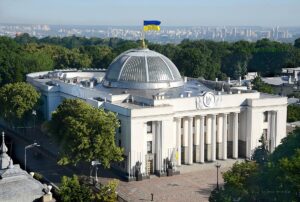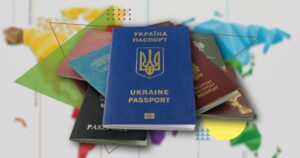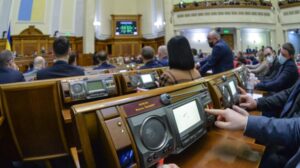
The Verkhovna Rada, at the suggestion of newly appointed Prime Minister Yulia Svyrydenko, approved the new lineup of the Cabinet of Ministers of Ukraine.
The appointment of government members was voted on at a plenary session on Thursday, which was held as a package (except for the Minister of Defense and the Minister of Foreign Affairs, whose candidates are nominated by the president), with 253 MPs voting in favor.
The online broadcast of the Ukrainian parliament session on YouTube is being conducted by MP Yaroslav Zheleznyak (Voice faction).
In particular, Mykhailo Fedorov was promoted to First Deputy Prime Minister of Ukraine – Minister of Digital Transformation (previously Deputy Prime Minister for Innovation, Education, Science and Technology – Minister of Digital Transformation).
The new Deputy Prime Minister for European and Euro-Atlantic Integration is former Deputy Minister of Economy and Trade Representative of Ukraine Taras Kachka.
The head of the large combined Ministry of Economy, Environment, and Agriculture is now Oleksiy Sobolev, former first deputy minister of economy of Ukraine (previously, the position of minister of economy was held by Svyrydenko, minister of environmental protection by Svitlana Grynychuk, and minister of agrarian policy by Vitaliy Koval). – Vitaliy Koval).
Another new official is former First Deputy Minister of Finance Denys Ulyutin, who heads the merged Ministry of Social Policy, Family, and Unity of Ukraine (previously, the position of Minister of Social Policy was held by Oksana Zholnovich, and Minister of National Unity – Oleksiy Chernyshov).
There are also several officials who remained in the new Cabinet but in new positions, including Herman Galushchenko, who became Minister of Justice (previously Minister of Energy), and Svitlana Grinchuk, who became Minister of Energy (previously Minister of Environmental Protection and Natural Resources).
In addition, Deputy Prime Minister for Recovery, Minister of Community and Territorial Development Oleksiy Kuleba, Minister of Youth and Sports Matviy Bedny, Minister for Veterans Affairs Nataliya Kalmykova, Minister of Internal Affairs Ihor Klymenko, Minister of Education and Science Oksen Lisovyi, Minister of Health Viktor Lyashko, and Minister of Finance Serhiy Marchenko retained their positions from the previous government.
In addition, on Thursday, Denys Shmyhal is to be appointed Minister of Defense, who will also oversee strategic industries (he previously held the post of Prime Minister), and Andriy Sybiga is to be reappointed Minister of Foreign Affairs.
At the same time, the Rada did not appoint a new Minister of Culture today because, as previously stated by the head of the ruling Servant of the People faction, Davyd Arakhamia, consultations on candidates are still ongoing.
Thus, the following positions in the new government were not filled: former Deputy Prime Minister for European and Euro-Atlantic Integration of Ukraine – Minister of Justice of Ukraine Olha Stefanishyna (the president appointed her as the special representative of the president of Ukraine for the development of cooperation with the US, while her candidacy for the post of ambassador to the US is being agreed upon) former Deputy Prime Minister – Minister of National Unity of Ukraine Oleksiy Chernyshov, former Minister of the Cabinet of Ministers Oleg Nemchinov, former Minister of Social Policy Oksana Zholnovich, former Minister of Agrarian Policy and Food Vitaliy Koval (may return to the post of head of the State Property Fund of Ukraine), former Minister of Culture and Strategic Communications Mykola Tochitsky (may become Ukraine’s permanent representative to the Council of Europe), former Minister of Strategic Industries German Smetanin (will head Ukroboronprom) and former Minister of Defense of
Ukraine Rustem Umerov (is being considered for appointment as Secretary of the National Security and Defense Council).

The Verkhovna Rada has passed a bill on multiple citizenship in the first reading, MP Yaroslav Zheleznyak said.
“The Rada supported as a basis the law No. 11469 on the introduction of multiple citizenship in Ukraine,” Zheleznyak wrote in Telegram.
According to him, the bill was supported by 247 MPs at the plenary session of the Verkhovna Rada on Tuesday.

The Verkhovna Rada has enshrined the status of English as one of the languages of international communication in Ukraine, Yaroslav Zheleznyak, a member of the Voice faction, said in a telegram.
According to him, 236 MPs voted in favor of Bill No. 9432 on the use of English in Ukraine at the plenary session of the Verkhovna Rada on Tuesday.
As reported, according to the draft law, the state ensures compulsory study of English and promotes the study of other languages of international communication in educational institutions regardless of ownership.
In addition, the bill stipulates that preschool education institutions provide compulsory English language learning for children of older preschool age. At the same time, preschool education institutions shall ensure the mandatory use of English in the educational process for children of early, junior preschool and middle preschool age.
According to the draft law, a higher education institution has the right to decide to teach one, several or most disciplines, perform individual tasks and conduct control measures in English, which is clearly stated in the description of the educational program upon admission to the university.
The draft law also stipulates that English may also be used in the Armed Forces of Ukraine and the National Guard as a language of international communication.
The draft law provides for the development and approval of a state targeted program to promote the study and use of English in Ukraine, which, in particular, should take into account the peculiarities of ensuring that cinemas (relevant cinematography entities) show foreign films in English in compliance with the requirements established by the Law “On Ensuring the Functioning of the Ukrainian Language as the State Language”.
The draft law also stipulates that foreign films in English shall be screened on a reimbursable basis by cinematography entities on a voluntary basis, but in compliance with the minimum requirements.
In particular, each cinema hall in which a cinematography entity shows films must hold at least 8 demonstrations (public screenings) of films in English during a calendar month, with at least 2 demonstrations to be held during the week at any time on a weekend or on a working day with the start of the screening after 18:00.

The Verkhovna Rada has appealed to the European Union member states and EU institutions to support the opening of negotiations on Ukraine’s accession to the European Union. The relevant resolution No. 10315 was voted for by 292 MPs at the plenary session of the Verkhovna Rada on Saturday, said Oleksiy Honcharenko, a member of the European Solidarity faction.
“The Verkhovna Rada appeals to the national parliaments and governments of the European Union member states, the EU institutions and calls… to support Ukraine’s aspirations to join the European Union by adopting a decision to open negotiations on Ukraine’s membership in the European Union during the European Council meeting on December 15, 2023,” the text of the appeal reads.
The MPs also called on EU members to increase military assistance to Ukraine both at the national level and within the framework of the European Peace Fund.

The Verkhovna Rada has passed in the second reading and as a whole the law “On state regulation of genetically engineered activities and state control over the placement of genetically modified organisms and products on the market”.
The corresponding bill №5839 was supported by 276 people’s deputies at the plenary session on Wednesday, a member of the faction “Golos” Yaroslav Zheleznyak reported in Telegram.
According to the explanatory note, the document defines the legal and organizational basis for the state regulation of genetically engineered activities, ensuring environmental, genetic, food and biological security of the state and state control over the placement of genetically modified organisms and products on the market.
It defines the terms “genetically modified organism”, “genetically modified products”, “GM products as a food product”, introduces state registration of GMOs, etc.
Before the law was adopted in the second reading, it was amended to prohibit the cultivation and import of GM corn, as well as the cultivation of genetically modified sugar beets and rapeseed for five years.
The document introduces a comprehensive regulation of the legal and organizational foundations of genetically engineered activities by means of state supervision (control) over the use of genetically modified organisms and the turnover of GM products.
The bill also delimits the powers of state authorities to avoid duplication of functions in the sphere of GMO handling; improves the system of GMO risk assessment with regard to possible impact on human health and the natural environment; introduces European mechanisms for state registration of GMOs; improves requirements for labeling of GM products and introduces rules for their traceability; strengthens state control in the sphere of GMO handling and establishes liability for violation of legislation in this sphere.

The Verkhovna Rada has exempted from value added tax (VAT) a number of goods imported to Ukraine for security and defense needs.
A total of 294 people’s deputies voted for the relevant draft law No. 9467 on amendments to the transitional provisions of the Tax Code on the peculiarities of importing into the customs territory of Ukraine goods for security and defense needs at the plenary session on Friday, a member of the faction “Golos” Yaroslav Zheleznyak said in his Telegram channel.
The bill exempts from VAT thermal imaging binoculars, monoculars and binoculars, night vision devices and rangefinders that are imported into the customs territory of Ukraine.